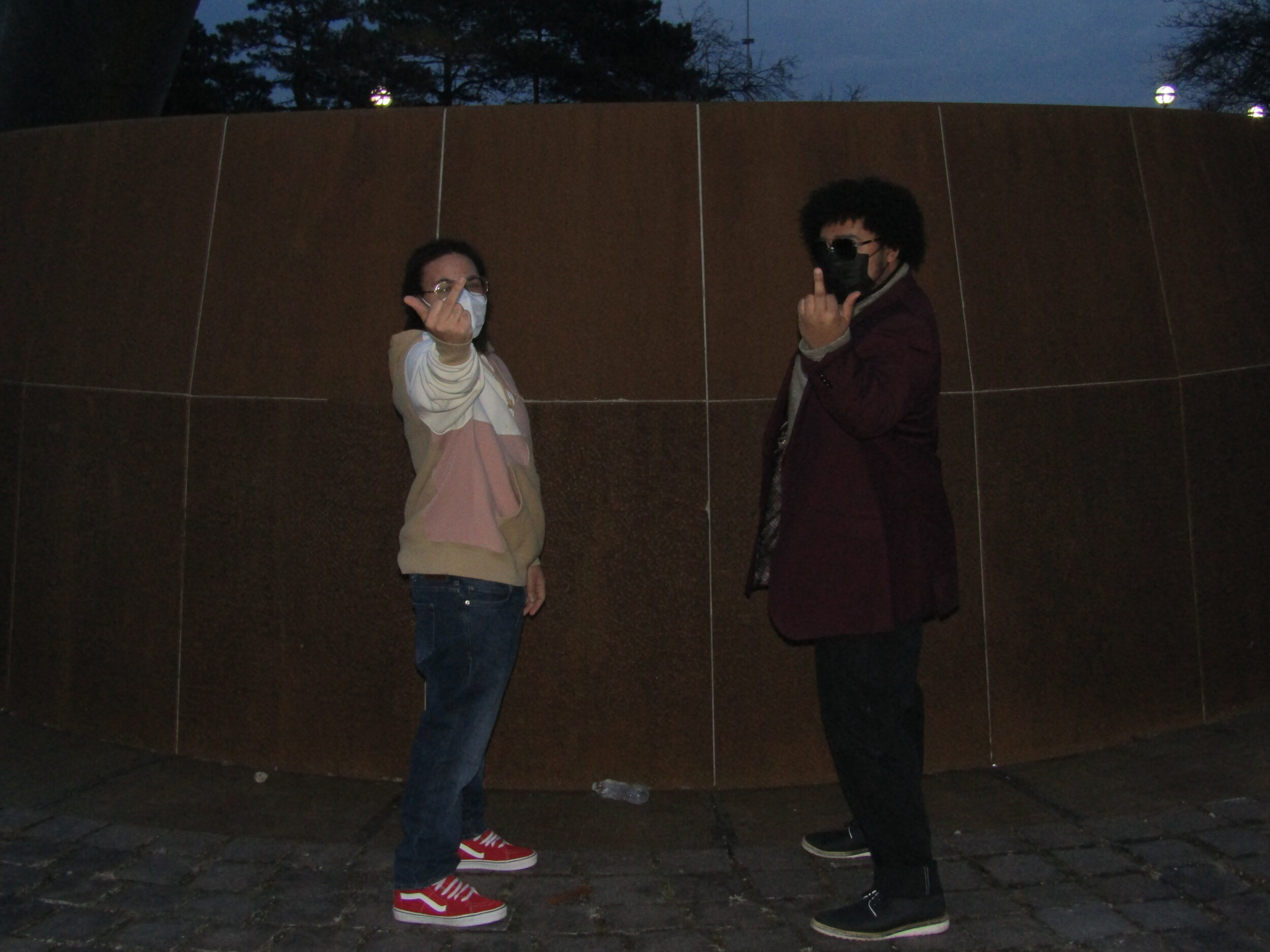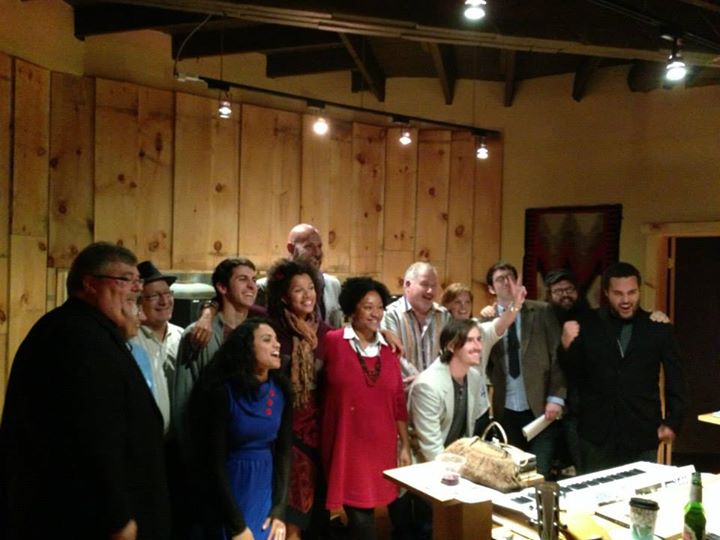A music scene isn’t just the folks you see leaving and returning to the state for big concerts, it’s made up of individuals who have dedicated portions of their full lives to performing, recording, and educating around music. These people give more depth to a scene than what can be quickly summarized in an ad campaign, and it’s artists like Jay Gavan who combine their passions to create something unique among his local peers. Part social commentary, historical storytelling, and diverse prog/classic rock opera, A Public Thing shows how a focused passion around a concept can be colorful and compelling without being sonically claustrophobic. It is a rich piece of art that whimsically parallels current empires with past civilizations and builds theatrical set pieces with the nostalgic rock idioms in delightful ways, whether you’re a seasoned musician or just a history buff with a craving for a good story.
The first track, “Collapse,” is a commentary on how all empires eventually fall. The constant ups and downs of civilization, be it from progress or from warfare, are observed elements of culture, rather than merely isolated stories distilled purely into poetic songs that “dinner guests remembered.” However, in that same lyric, Jay summarizes how most people learn about history through entertainment, whether in catchy songs, staged plays, or well-crafted media experiences that lead to better retention, even if from a skewed perspective. There’s an Egyptian flavor to the beginning of the song that moves through different chord changes that are reminiscent of classic prog rock bands. The twangy electric guitar in the slower spots adds a touch of a “country ballad vibe” to this eccentric opening track. Next, “Owl Eyes” begins to tell the tale of Ancient Greek civilizations at war, the foundational story that the music and lyrical parallels will build on throughout the record. This folk rock tune begins the historical storytelling of Athens in 431 BCE, preceding the inevitable conflicts that the then ruler, Pericles, would have to endure against the Spartans from Peloponnesian League. The ending of each chorus states “Liberty Forever - Is it safe to assume?,” commenting on the messaging citizens often receive from their governing bodies of why a war is happening, drawing a parallel to current American perceptions of why the country involves itself overseas.
The titular ruler “Pericles” is examined in this grooving prog rock tune that is reminiscent of British Invasion styles of classic rock, alternating between straight rock jams with odd metered turnarounds and stylized verses that dip into cartoonish backdrops with acoustic guitar solos reminiscent of jazz manouche. There are also parallels to everyone’s favorite recently ousted and fake-currently-installed real estate mogul President, whose name escapes me, that parallel some of the leadership tactics of Pericles’ ancient political opponents. “The Flutes” centers on a surf rock sound that would probably draw from the same inspirations as Grand Rapids-based surf rock band, The Concussions. However, building the song around the Spartans’ advance places the mood closer to a B-52s track while listening. The lyrics and tone of the tune shift to reflect the perspective of the ruling class under Pericles, sitting comfortably behind the walls of an empire built with colonizing blood that seeks to ignore problems rather than have to directly confront them. “Meet the Press” is a sinister sounding bluesy tune that outlines the press as a diligent “thorn in your side,” seeking out the truth and preserving the integrity of their source material. It speaks as a warning to the powerful entities in this story with lines like “If there’s a smoking gun, we’re gonna find it.” There’s also an electric guitar solo that shows some of Jay’s jazz vocabulary while remaining tasteful to the character of the track. With “Echo Chamber,” listeners are back on the beach with this even more nostalgic surf rock, this time commenting on social media being the modern day “soothsayer,” with an additional observation on the categories society falls into on the internet when arguments start “taking sides: “Only half believes reality, the other half wants to secede/ A third half is tickled by the first two halves' stupidity.”
Earlier, the Spartans are merely described as the righteous army combatting a colonizing empire, but in “Spartan Education,” this doo-wop song serves to use the same fighting force to examine the messaging that often goes into military recruitment. There are so many things to “forget” in the pursuit of transforming into the “perfect soldier” (math, science, history, literature, philosophy), but all of the ignorance can be replaced by orders, allegiance, and the overwhelming power that comes from a holy war. The references to other songs in American music history that directly counteract the real world pain from wars, atrocities, and economic depressions are abundant in this tune. “Earth Angels Beyond the Sea Sleepwalking” refers to more popular American tunes by Harry Waters Jr./Marvin Barry/The Starlighters, Bobby Darin, and Johnny and Santo, all invoking imagery of other worldly experiences but tied to the doo-wop and crooner aesthetic. “Chain Gang In an Aeroplane Over the Sea/ You gotta Let It Be!” referring to tunes by Sam Cooke, Neutral Milk Hotel, and The Beatles, centering around themes of oppression with the reassurance that comes from past wisdom that things will improve. Still another verse references The Marcels and Ben E. King, possibly Cold War Kids. Chatting briefly with Jay, he mentioned that on a basic level he wanted to reference “four-chord songs” that he references in the lyricism, but these choices definitely add to the depth of the music regardless. Every single reference plays to the decade of such disparate emotions with WWII and post-war civil rights issues being juxtaposed with some of the happiest music, skewing the lens of history for some looking back.
As previously mentioned, a lot of characters and opinions have their own thematic material, and Symposium changes thematically whenever Socrates speaks. The responses point to more modern commentary on the current American political landscape. The latter portion of the song returns to the character of “Owl Eyes,” paralleling the concept of history repeating itself. “Strange Arrow” is a mellow jazz number detailing a grumpy, lonely man at the bar finding love in an old saloon, realizing that he was “the only one getting his cover charge’s worth.” As Jay described, he used this track to detail a personal love story while also serving as a transition into the next tune. There is a reference to Eros, which fits thematically with the Ancient Greek storytelling and to the theme of this song, since Eros is like cupid in mythology, but with the added power to make someone repulsed by another.
Lysistrata” refers to an old comedic play telling the story of a woman who tried to end the conflict between the various Greek states by organizing a sex strike against all of the men involved as a way to force more peaceful negotiations, since war time often involves “sexual conquest” (from the romanticized love to the more violent). The lyricism also advocates for more women being heard in areas of male authority, with the reference to Athena, Zeus’ wife in mythology, as being the type of female-focused guidance a polytheistic nation should center around (paralleling the generations of women’s rights movements). There is a reference to “Meet the Press” in parts of this tune, showing a more biased, nuanced portrayal of how major news sources can function. The lyrics switch from “We’re the press” to “Tell Us What You Want,” favoring the more gossip and sensational story over the genuine grievances of those reporting information. The tonal shift of the press from a formal, stalwart bastion of information to a soothsayer of sorts is expressed in lines like “(We’re the press) we don’t discriminate/ Unbiased in our coverage of love and hate/ (Tell us what you want), we’ll consider our arrears/ For at least twenty-five hundred years…” Jay could have also been using “arrears” as a double meaning, since it sounds like “errors” upon first listen, showing how history/news is full of errors based on who is telling the story. “Arrears,” or money that hasn’t been paid yet for debts, speaks to the trend of “we’ll correct the record when the time is right,” serving as a way to comment on America’s misrepresentation of its own history in part from historical press records serving a propaganda campaign. The line “When men are driving, no one asks the way” is a succinct way of summarizing the lyrical themes in this track.
“Wine Dark Sea” is a calming samba that drives home the point made in previous tracks of an idyllic picture of life versus the reality that is observed. “You” has access to entertaining and sculpted representations of society while “We” has access to the more accurate measurements and depictions of history. The “Wine Dark Sea” also calls back to the depictions of bloodied seas in battle. “The Demos” is one last tune commenting on how history is often the first draft, and we all need to “listen back to the demos,” referring to the revision process that goes into the music writing and production. The musicians in the studio are the ones creating the “history” and the executives at the top of the music companies retell and repackage the art for whatever grabs the most listeners and yields the best results, much like selective re-telling of history serves different purposes rather than learning from the people that directly lived through these moments. “Demos” also translates to “the people,” which in ancient Greece refers to the “voting public.” The chorus leaves one final message for the listener: “Let’s listen back, we’ll listen back to the demos/ You won’t hear no hate, no gender, class or race in the demos/ Then tell that older generation/ When they try to throw that boomer-ang right at you/ Fear of change only curses fools/ You gotta listen back, just listen back to the demos.”
This record was equal parts challenging and rewarding to listen to and examine as a musician and critic. Musically, there are wonderful callbacks to earlier themes and musical motifs that help reinforce the storytelling and hone in on the idea of “history repeating itself.” The exploration of different genres within the overarching rock style helps to strengthen the diversity of the various characters and subjects presented lyrically, whether they be Ancient Greek conflicts or modern day socio-political commentary. There are plenty of moments where songwriting shines through, with choruses that hook you back into the narrative and ground you in the materials presented. The astute history student can spend hours connecting the lines of historical references to the present. The seasoned music enthusiast or career musician can dissect how certain styles enhance the storytelling or various references create moments of meta-commentary. The classic rock super fan can delight in the various ways Jay showcases his love for artists of all decades while drawing broader parallels to artists like Pink Floyd, Yes, or Emerson, Lake & Palmer. It’s a record that immediately changes from “hobbyist, quirky album” to “well-realized concept piece by a huge fan of history, storytelling, and education.”
Bandcamp: https://jaygavan.bandcamp.com/
Soundcloud: https://soundcloud.com/jay-gavan
Written, Recorded and Produced by Jay Gavan at the Kalamazoo Academy of Rock in Kalamazoo, Michigan in 2021: www.kzoorock.com
Mastered by Mike Roche at Broadside Productions: www.broadsideproductions.com








